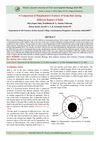 8 citations,
March 2020 in “Frontiers in Cell and Developmental Biology”
8 citations,
March 2020 in “Frontiers in Cell and Developmental Biology” Researchers created immortal human skin cells with constant testosterone receptor activity to study hair loss and test treatments.
 6 citations,
January 2020 in “Postepy Dermatologii I Alergologii”
6 citations,
January 2020 in “Postepy Dermatologii I Alergologii” Check and treat low iron and vitamin D levels in people with hair loss.
 July 2023 in “The Egyptian Journal of Hospital Medicine ”
July 2023 in “The Egyptian Journal of Hospital Medicine ” Alopecia areata is a hair loss condition caused by immune factors and can be treated with JAK inhibitors.
[object Object]  December 2022 in “Kristu Jayanti Journal of Core and Applied Biology (KJCAB)”
December 2022 in “Kristu Jayanti Journal of Core and Applied Biology (KJCAB)” Scalp hair characteristics vary across different regions of India and can help identify a person's origin.
 86 citations,
February 2003 in “Journal of The American Academy of Dermatology”
86 citations,
February 2003 in “Journal of The American Academy of Dermatology” New methods improve how we test hair growth treatments, but challenges like slow hair changes and high costs remain.
 70 citations,
February 2015 in “Expert Opinion on Drug Discovery”
70 citations,
February 2015 in “Expert Opinion on Drug Discovery” Topical drugs and near-infrared light therapy show potential for treating alopecia.
 21 citations,
May 1996 in “Current problems in dermatology”
21 citations,
May 1996 in “Current problems in dermatology” Detailed patient history and physical exams are crucial for diagnosing hair loss.
 8 citations,
January 2017 in “Stem Cells International”
8 citations,
January 2017 in “Stem Cells International” A protein called sFRP4 from skin cells stops the development of pigment-producing cells in hair.
 January 2020 in “Der Pharmacia Lettre”
January 2020 in “Der Pharmacia Lettre” Nanoparticle-based herbal remedies could be promising for treating hair loss with fewer side effects and lower cost, but more research is needed.
 January 2025 in “International Journal of Advanced Research in Science Communication and Technology”
January 2025 in “International Journal of Advanced Research in Science Communication and Technology” Polyherbal hair dyes are safer and more eco-friendly than chemical dyes.
 June 2021 in “Journal of emerging technologies and innovative research”
June 2021 in “Journal of emerging technologies and innovative research” Onion and Aloe vera can help protect hair from damage caused by hair dyes.
 October 2020 in “Journal of Aesthetic Nursing”
October 2020 in “Journal of Aesthetic Nursing” Platelet-rich plasma (PRP) injections effectively treat hair loss and thinning in both men and women, with high satisfaction and no major side effects.
 209 citations,
September 2008 in “Dermatologic Therapy”
209 citations,
September 2008 in “Dermatologic Therapy” Androgens can both increase and decrease hair growth in different parts of the body.
 91 citations,
August 2015 in “Anais Brasileiros De Dermatologia”
91 citations,
August 2015 in “Anais Brasileiros De Dermatologia” Female Pattern Hair Loss affects women's self-esteem and needs more research for better treatment.
 51 citations,
January 2003 in “Hormone Research in Paediatrics”
51 citations,
January 2003 in “Hormone Research in Paediatrics” Hormones and their receptors, especially androgens, play a key role in hair growth and disorders like baldness.
 47 citations,
August 2016 in “Fitoterapia”
47 citations,
August 2016 in “Fitoterapia” Some herbs and their components might help treat hair loss by affecting various biological pathways, but more research and regulation are needed.
 20 citations,
October 2018 in “Aesthetic Plastic Surgery”
20 citations,
October 2018 in “Aesthetic Plastic Surgery” PRP shows promise for improving facial wrinkles, skin elasticity, and hair growth, but more research is needed to standardize its use and understand its effects.
 16 citations,
December 2006 in “Expert Review of Dermatology”
16 citations,
December 2006 in “Expert Review of Dermatology” Hair follicles are essential for skin health, aiding in hair growth, wound healing, and immune function.
[object Object]  15 citations,
January 2015 in “Skin Pharmacology and Physiology”
15 citations,
January 2015 in “Skin Pharmacology and Physiology” Parathyroid hormones are important for hair growth, but their use in treating hair loss from chemotherapy is still uncertain.
 13 citations,
May 2021 in “Plants”
13 citations,
May 2021 in “Plants” The leaf extract of Leea indica may reduce inflammation, dissolve blood clots, and promote hair growth.
 1 citations,
March 2018 in “bioRxiv (Cold Spring Harbor Laboratory)”
1 citations,
March 2018 in “bioRxiv (Cold Spring Harbor Laboratory)” The hair treatment made hair grow faster and thicker and strengthened the hair roots.
 1 citations,
December 2018 in “IntechOpen eBooks”
1 citations,
December 2018 in “IntechOpen eBooks” Human hair shows promise for non-invasive medical testing, but more research is needed to standardize its use.

Researchers found a genetic link for hereditary hair loss but need more analysis to identify the exact gene.
 5 citations,
May 2022 in “Biomedicines”
5 citations,
May 2022 in “Biomedicines” Botryococcus terribilis and its compounds may promote hair growth and improve hair health.
 4 citations,
June 2022 in “Indian Dermatology Online Journal”
4 citations,
June 2022 in “Indian Dermatology Online Journal” COVID-19 may cause temporary hair loss due to direct damage to hair follicles, but it usually gets better on its own.
August 2024 in “Nutrients” Probiotics help reduce hair loss and increase hair growth in people with androgenic alopecia.
 August 2024 in “Applied Sciences”
August 2024 in “Applied Sciences” Plant extracts may help prevent or reverse hair graying.
 October 2023 in “Biomaterials”
October 2023 in “Biomaterials” Nanotechnology could improve hair regrowth but faces challenges like complexity and safety concerns.
11 citations,
May 2012 in “Genesis” Bmpr2 and Acvr2a receptors are crucial for hair retention and color.
9 citations,
June 2022 in “Plants” Shallot extract may help with hair growth and treating hair loss.



























